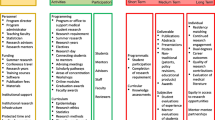Abstract
Research experiences in various forms have been available to medical students for many decades. However, recently, there has been a trend to integrate this opportunity into existing curriculum through scholarly concentration programs. The impetus for including research during medical school is to acquire and develop critical thinking and analytical skills prior to residency without adding time to undergraduate medical education. Research program structure, feedback, and survey outcomes from the newly formed Oakland University William Beaumont School of Medicine (OUWB) are presented. Conclusions drawn support the potential for rigorous future research endeavors as the students move into their graduate medical education.


Similar content being viewed by others
References
Cruser des A, Brown SK, Ingram JR, Papa F, Podawiltz AL, Lee D, Knox V. Practitioner Research Literacy Skills in Undergraduate Medical Education: Thinking Globally, Acting Locally. Journal International Association of Medical Science Educators. No.3 s – articles. http://www.iamse.org/artman/publish/printer_680.shtml, retrieved 10–7-15.
Adkison LR, Glaros AG. Assessing research competency in a Medical School environment. Medical Science Educator Short Communication. 2012;22(3S):139–42.
Bierer SB, Chen HC. How to measure success: the impact of scholarly concentrations on students-A literature review. Acad Med. 2010;85:438–52.
Brannan GD, Dogbey GY, McCament CL. A psychometric analysis of research perceptions in Osteopathic Medical Education. Medical Science Educator. 2012;22(3S):151–61.
Brousseau DC, Harder DR. Integration of the Medical College of Wisconsin Physician Scientist Pathway and Summer Research Programs to increase medical student research skills. Medical Science Educator. 2013;23(1S):84–7.
Colmenares C, Bierer SB, Graham LM. Impact of a 5-year research-oriented medical school curriculum on medical student research interest, scholarly output, and career intentions. Medical Science Educator. 2013;23(1S):88–91.
Gotterer GS, O’Day D, Miller BM. The emphasis program: a scholarly concentrations program at Vanderbilt University School Of Medicine. Acad Med. 2010;85(11):1717–24.
Green EP, Borkan JM, Pross SH, Adler SR, Nothnagle M, Parsonnet J, Adler SR. Encouraging scholarship: medical school programs to promote student inquiry beyond the traditional medical curriculum. Acad Med. 2010;85(3):409–18.
Boninger M, Troen P, Green E, Borkan J, Lance-Jones C, Humphrey A, Gruppuso P, Kant P, McGee J, Wilochell M, Schor N, Kanter S, Levine AS. Implementation of a longitudinal mentored scholarly project: an approach at two medical schools. Acad Med. 2010;85(3):429–37.
Rickards E, Borkan J, Gruppuso PA. Educating the next generation of leaders in medicine: the scholarly concentrations program at the Warren Alpert Medical School of Brown University. Medicine and Health Rhode Island. 2007;90(9):275–82.
Schor NF, Toren P, Kanter SL, Levine AS. The Scholarly Project Initiative: Introducing Scholarship in Medicine through a Longitudinal, Mentored Curricular Program. Acad Med. 2005;80(9):824–31.
Areephanthu CJ, Bole R, Stratton T, Kelly TH, Starnes CP, Saway BP. Impact of Professional Student Mentored Research Fellowship on Medical Education and Academic Medicine Career Path. Clin Transl Sci. 2015. doi:10.1111/cts.12289.
Duggan E, Doran K, O’Flynn S, O’Tuathaigh CMP. Providing research opportunities for medical students: challenges and opportunities. Medical Science Educator. 2013;23(1S):99–107.
Areephanthu CJ, Bole R, Stratton T, Kelly TH, Starnes CP, and Saway BP. Impact of Professional Student Mentored Research Fellowship on Medical Education and Academic Medicine Career Path. WWW.CTSJOURNAL.COM, Clin Trans Sci; 2015;Volume#:1–5.
Lennon RP, Oberhofer AL, NcNair V, Keck JW. Curriculum changes to increase research in a family medicine residency program. Fam Med. 2014;46(4):294–8.
Swanberg S, Dereski M. Structured Abstracts: Best Practices in Writing and Reviewing Abstract for Publication and Presentation. MedEdPORTAL Publications; 2014. Available from: https://www.mededportal.org/publication/9908 http://dx.doi.org/10.15766/mep_2374-8265.9908
Zier K, Friedman E, Smith L. Supportive programs increase medical students’ research interest and productivity. Journal of Investigative Medicine. 2006;54(4):201–7.
Laskowitz DT, Drucker RP, Parsonnet J, Cross PC, Gesudheit N. Engaging students in dedicated research and scholarship during medical school: the long-term experiences at Duke and Stanford. Acad Med. 2010;85(3):419–28.
Acknowledgments
The author would like to acknowledge all of the faculty and staff who have contributed to the Capstone Program since its inception.
Author information
Authors and Affiliations
Corresponding author
Ethics declarations
The Oakland University Internal Review Board approved the inaugural class exit survey. All other data utilized in this manuscript did not require IRB approval due to its nature as program evaluation.
Funding Source
No funds were received for initiating and completing this work.
Disclosures
None.
Disclaimer
None.
Rights and permissions
About this article
Cite this article
Dereski, M.O. Medical Student Research: Program Structure, Feedback, and Outcomes at a New Medical School. Med.Sci.Educ. 26, 255–262 (2016). https://doi.org/10.1007/s40670-016-0238-7
Published:
Issue Date:
DOI: https://doi.org/10.1007/s40670-016-0238-7




